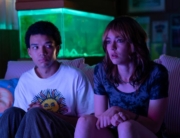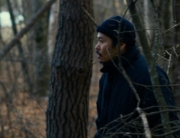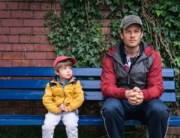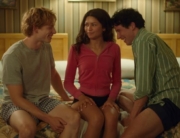![]() Director Anne Fontaine’s stirring The Innocents takes religious faith as a starting point and looks at compromised belief within a Polish abbey in the disastrous aftermath of World War II. Based on true events, the film raises questions of duty and sacrifice, ultimately shining with a kinder outlook on life than its forbidding start suggests. It also delivers a high-wattage performance from Lou de Laâge, now graduated from ingénue roles and settling into stardom with a radiant, commanding presence.
Director Anne Fontaine’s stirring The Innocents takes religious faith as a starting point and looks at compromised belief within a Polish abbey in the disastrous aftermath of World War II. Based on true events, the film raises questions of duty and sacrifice, ultimately shining with a kinder outlook on life than its forbidding start suggests. It also delivers a high-wattage performance from Lou de Laâge, now graduated from ingénue roles and settling into stardom with a radiant, commanding presence.
As the film begins, muffled cries echo within a nunnery’s walls. Disturbances, seen and unseen, interrupt the nuns’ harmonious singing. Sisters scurry about in alarm, framed by confining arches and pillars. When one escapes the convent to hurtle across frozen fields, her speed reveals she’s on a mission. The nun, still a teenager, urgently seeks a doctor and collars one at a French Red Cross hospital. Stepping out its doors, young military medic Mathilde Beaulieu (de Laâge) reluctantly embarks on a journey that will change her life.
Beaulieu’s ministering to a pregnant nun hidden behind closed doors leads to a gradual teasing out of a terrible story: Russian soldiers have been through the nunnery and committed mass rapes, and the sisters now live with taboo pregnancies. Stalwart Sister Maria (Agata Buzek) and a steely mother superior (Agata Kulesza, in somewhat of a reprise of her role as the hard-bitten communist bureaucrat in Ida) lean hard on the doctor to deliver the babies. They also swear her to secrecy.
Like faith under fire, shame and secrets run deep as the film’s central themes. Beaulieu has to keep her mission hush-hush from the command at base camp as she sneaks off to nightly emergency rounds. Nuns hide their bodies in modesty that prevents effective treatment. A prickly but devoted colleague and Beaulieu’s sometime suitor (Vincent Macaigne) conceals his wartime bitterness. Beaulieu’s own encounter with horrifying sexual violence has to remain hidden. And a twisted scheme around the fate of the newborns fans waves of disbelief and horror when it comes to light.
Throughout these turbulent events, de Laâge smolders as a young woman prematurely wearied by war but still game for life’s pleasures and opportunities to do good. Cinematographer Caroline Champetier captures conflicting desires beneath de Laâge’s obstinate beauty in lingering candlelit shots. Buzek also turns in a strong performance as a committed believer forced to step outside the strictures of her religion to help the doctor save lives. Beaulieu’s growing rapport with Sister Maria and the other nuns provides a sturdy gradual narrative thread, compensating for some choppy episodes.
The drama dilutes its power with too many scenes of panicked pregnancies and scary deliveries. It ends on a von Trapp-ish note that may feel too good to be true. But along the way the movie has provoked reflections on belief, loyalty, and honor, and the way those principles can guide and reassure people facing unwanted choices. Handling old-school concepts with openness and insight, Fontaine’s film adds up to a powerful, luminous experience.







Leave A Comment